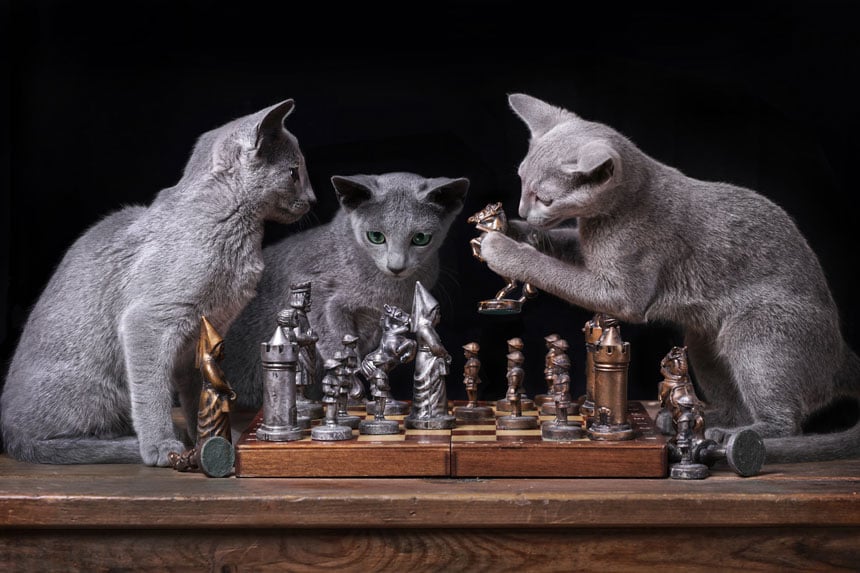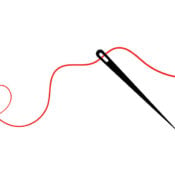Nikolai Pushkin, a 20-year-old chess prodigy from a remote Russian village, was out of moves. It had been only three weeks since Nikolai had defected to the West from the Soviet Union, and now he occupied a bench outside Broadway’s Winter Garden Theatre in a velour tracksuit (his first American purchase), resolving never to move from there.
Aided by executives of the U.S. Chess Federation, Nikolai had fled the 1989 World Team Chess Championships in Lucerne, Switzerland, where the Soviets won easily without him, an outcome that both alleviated his guilt and wounded his pride. His dream of America was to see Cats; meet its mayor, Ed Koch; gaze over magnificent Manhattan from atop the Empire State Building. But once safely across the ocean, he found himself in Buffalo, New York, where his new American handlers resided. Not understanding the difference between New York State and New York City, it took Nikolai some time to realize he was 620-some kilometers from the magical place of Cats, Koch, and what he believed was still the world’s tallest building.
Just as he’d slipped away from his KGB overseers from a fitting room in a mall in Lucerne, he did so again from his new American friends and hitchhiked the New York Thruway, his fumbling English just enough to get him to Manhattan. He was surprised on his arrival to find the bustle of Broadway quiet, its lights dark and the Winter Garden box office shuttered. New to all things American, Nikolai had no way of knowing that Broadway’s playhouses were uniformly closed on Mondays. With only one night in Manhattan before his first U.S. chess match scheduled for the following evening — a minor tournament upstate that he was expected to win easily — Nikolai felt the sadness of a small boy who’d just missed the last train to a village made entirely of chocolate. He sat until long past the time the curtain would have risen and the cats of the title would have prowled and Grizabella would sing her way back into the good graces of the Jellicles, and die.
And still Nikolai stared straight ahead from his bench outside the Winter Garden Theatre, neither paralyzed nor catatonic, despite appearances. He’d come to realize that every time he went someplace new, it had resulted in a negative outcome: first from his small village at the terminus of a lumber railroad all the way to Moscow, rigorously drilled in gambits and attacks and awash in loneliness; then to America, an act of treason for which the family he’d left would be punished. And now here in New York, where the Cats he longed for napped tonight. The gift that had made him a chess prodigy — the ability to see several moves ahead, literally into the future — had left him when it came to his own forward momentum. Although he recognized this current setback as a minor one in the larger scheme of his defection, he was forced to consider the happenstance; what were the odds that the one day he’d chosen to travel to New York would to be the day all of Broadway ceased its singing and dancing and meowing? He resolved not to move any further — not back to his hotel tonight or to the tournament tomorrow, or anywhere ever again. Immobility would be his protector from further disappointment.
He sat there for a long time before being joined by an elderly man who lowered himself slowly onto the bench. Nikolai was certain raising him would require greater effort than the man was capable of, and that without Nikolai’s assistance he’d likely perish in his seat before a passing New Yorker might offer aid. Nikolai wasn’t sure he’d help the man when the time came, although he knew he’d outlast the old man on the bench, committed as he was to immobility as a hedge against further disaster.
The old man began to hum, and Nikolai soon recognized the tune as “All by Myself.” He was forced to wonder if the old man could somehow know his circumstances and was mocking him for it. He thought about leaving, but that would mean the kind of movement that might propel him to further misfortune elsewhere, so he sat, a willing hostage to inertia. He watched the man’s fingers twitch as the hummed melody grew more complex than that simple, sad dirge, and Nikolai knew he’d been mistaken: the man wasn’t humming that familiar weepy ballad by Eric Carmen, but the second movement from Rachmaninoff’s Piano Concerto No. 2 (later stolen by Carmen for his hit single), which Nikolai’s Red Army coach used to play before practice. When you’ve heard a song a thousand times or more, you tend to recognize it, even when gargled through the creaky larynx of a dying man.
Fucking Rachmaninoff, Nikolai mumbled in Russian, and the old man gasped and looked at Nikolai with surprise, then showered him with sentences in his native tongue. Nikolai had not heard the language of his home since defecting, and it excited him as a beautiful woman’s perfume might. The man introduced himself as Vladimir Horowitz. They shared where they were from, Nikolai’s youth in a nearly abandoned village located at Russia’s northern extreme, and memories of the family he missed spilling from his lips. He continued about his defection, and his life so far in a tiny corner of America that somehow was and wasn’t New York, and how he had come to this park bench.
“I left Russia in 1925, and was glad to be free from it,” Horowitz recalled. “I only went back three years ago. After 61 years! But I never stopped missing Russian culture. Find your way to Brighton Beach in Brooklyn for some small occasional solace, especially in winter.”
Nikolai told him he had no intention of ever leaving the bench they shared.
“One of us could remain here the rest of his life, and it isn’t the 20-year-old boy from the village at the edge of the world.”
Nikolai told him nothing is as he thought it would be.
“Nothing ever is to the young. Did I think I’d settle in America? Marry the daughter of Toscanini? Become famous, undergo shock treatment, lose a daughter, be declared the best pianist in the world? Only that last one.”
Nikolai told him he’d like to be the best chess player in the world.
“It will mean nothing to you when you’re old. What will mean everything are the surprises, the things you never thought would be.”
They sat in silence before Horowitz asked, “Are you musical?”
Nikolai replied that he was not personally but that he liked music very much, particularly “Fight the Power,” an anthem of resistance against oppression discovered in Nikolai’s first American movie experience, improbably titled Do the Right Thing though no one in the film seemed to do so. Horowitz seemed unfamiliar with it.
“Come back to my home, and I’ll play for you.”
Although leaving his bench meant risking further calamity, Nikolai could not refuse the invitation from his famous countryman under the unlikeliest of circumstances. He accompanied Vladimir Horowitz back to the Carnegie Hill townhouse he shared with his wife Wanda, who looked Nikolai up and down and laughed, “Tu es en retard et tu amènes un autre chien errant?”
“Mets juste une autre assiette, femme,” Horowitz spat back, and led Nikolai inside.
When Horowitz had met Wanda decades ago, she didn’t speak Russian and he didn’t speak Italian. It didn’t seem fair that only one should commit to learning the other’s language, so they both learned French. This particular exchange seemed to Nikolai not to be the romantic third language of love it might once have been.
The townhouse was impressive, five stories of old-world opulence: a sweeping central stair, candelabra everywhere, and patterned rugs, furniture, and wallpaper that hurt Nikolai’s eyes. A chandelier hung at the center of a great upstairs room with a high ceiling, and directly underneath was Horowitz’s famous Steinway Model D, a nine-foot concert grand piano. Presented to Horowitz in 1934 as a wedding gift, he insisted it travel with him as if it were a flute in a case. Because it wasn’t, windows had to be removed and the piano craned out of the townhouse to the street below and delivered to his concert venues, wherever they were, repeatedly and at great expense.
Even more impressive: Seated on the couch were conductor Leonard Bernstein and the mayor of New York City, Ed Koch.
“KOCH!” Nikolai shouted as if it were the Russian word for “fire” and he’d found the room ablaze.
“Nikolai recently defected from the Soviet Union to play chess for America,” Horowitz explained.
“Bravo,” Koch cheered, adding, “Screw those Russian bastards.”
It stung Nikolai, who still considered himself Russian, if not a bastard. Although he looked forward to one day confronting his countrymen, Karpov and Kasparov, across a chessboard and defeating them both, the bastards. He sat across from the others in a wingback chair and couldn’t take his eyes off Koch, which the mayor took as sincere flattery.
“Is that what you want?” Bernstein asked. “To play chess?”
More than anything, he told them, to be the greatest Grandmaster in history.
Such unfettered desire gave equal parts pause and envy to men of a certain age who knew better. “Beware the thing you want ‘more than anything,’” Horowitz cautioned. “I wanted Toscanini’s approval at any cost.”
Wanda entered with a tray of syrniki, setting it on the low table next to the half-empty bottle of vodka before joining the men. Bernstein plucked a syrniki from her tray, dunking it in sour cream and biting it gently.
“I desperately wanted to score films,” Bernstein lamented. “Not musicals, but to write a great film score. I did only one — Waterfront — and was miserable. Background music. Blaring horns that announced mediocrity. The audience only hears it at the beginning and the end, before the actors start talking and after they shut up.”
“Your ‘mediocrity’ earned you an Oscar nomination,” Horowitz reminded him.
“Brando could have beat the hell out of me and it would have been a less painful experience.”
His entire face clenched at the memory, and Nikolai understood for the first time that there were things a young man might do that would still aggrieve him nearly 40 years later.
“I wanted to be mayor of New York,” said Koch. “And very soon, I won’t be anymore. The downside of getting what you want more than anything is when it goes away.”
Koch poured short glasses of vodka for everyone and made certain to pass the first to Nikolai. Bernstein demurred as Horowitz settled before the piano.
“Sviridov,” he announced, and began to play.
He filled the room with a sad melody, his soul aching as if this would be his final time at the piano. (It would be.) Although Nikolai did not recognize the music, he was able to appreciate its Russianness. By the time Vladimir had played his final note, the combination of sensory stimulation — song, syrniki, vodka — had Nikolai in tears. After three more piano sonatas and another bottle of vodka, Wanda ordered everyone out and led her husband to bed.
It was past 1 a.m. and a waiting limousine whisked Koch from the townhouse. Nikolai teetered in place as Bernstein hailed a taxi; his driver would boast for years about the time he drove the great conductor, although he’d also driven Cher once. Nikolai followed on unsteady legs. He was very drunk and, having tasted the food of his nation and heard its music played by a revered countryman, terribly sad. Even sober and happy, he knew he was fated by his mobility to a negative outcome. In his current state, anything could happen. And it did, as he found himself, just three blocks away, outside the Consulate of the Russian Federation, where he decided to reverse-defect.
Nikolai rang the bell. Although it took minutes for someone to answer, he didn’t ring it again, perhaps hoping no one would come. When a young aide finally opened the door, appearing annoyed, Nikolai told him in slurred English that he wished to defect, pronouncing it “deflect.”
“You’re drunk,” the man told him, “And in the worst possible place for games. Go home.”
“Ya khochu uyti,” Nikolai repeated in Russian, adding that the man’s superiors would be very pleased to have him on Russian territory once again, if he would just allow him to step inside.
The man put his hand on Nikolai’s chest, halting him.
“Wait here,” he said, closing the door and returning inside.
Nikolai waited. He imagined the scene that would follow: pulled inside once they realized who he was, maybe roughed up a little. But not too badly — no one wanted to return him too damaged to play for Mother Russia. Interrogated, forced to sign a confession of wrongdoing and a statement denouncing his kidnapping by Americans. His family would be freed. He’d marry a pretty Russian girl who loved his celebrity and they’d have nothing to speak of across their years together, bringing unremarkable children into the world and then dying, one after the other.
As he was feeling the deep regret of the empty lifetime he’d just imagined in its entirety, a police car pulled up in front of the consulate and arrested Nikolai for public drunkenness. When the Soviets discovered the next morning that a minor diplomatic aide had turned away the young defector they were desperate to reclaim, the aide was recalled to Russia and dispatched to a cold, distant place to dig ditches, only to refill them.
Nikolai never returned to Buffalo, or played chess again, his disappearance a mystery. He lived incognito for decades in Brighton Beach, a tether to the parts of his home country he missed: the simmering smell of its food, the sadness of its music, the throaty muscularity of its language. Word had spread quickly among its population of Soviet expats of the defector’s presence; knowing his deep desire to remain anonymous, none were about to break the omertà of Brighton Beach. Still fearful that mobility led to terrible outcomes, Nikolai never left that community of Russian émigrés. It wasn’t until 2019 that he finally saw Cats — the movie. It left him unsettled.
Become a Saturday Evening Post member and enjoy unlimited access. Subscribe now




Comments
Great opening picture for the story Ken, which was an interesting New York Russian/American slice-of-life of a few decades ago. I enjoyed the descriptive, colorful references to the era, and the way the story played out. I like how you brought it up to the semi-present (2019) at the end with Nikolai finally getting to see ‘Cats’, even if it left him unsettled. His curiosity about it over that 30 years was probably enough to kill quite a few.